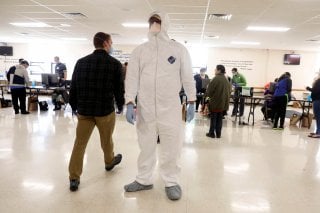Will the Coronavirus Outbreak Fundamentally Transform U.S. Elections?
If Liberia can conduct an election with polling places designed to prevent the spread of Ebola, then the United States surely has the ingenuity to do the same for the coronavirus.
We can learn something from Liberia. In 2014, while Ebola swept across western Africa, Liberia still conducted a national election. Liberia was at a critical point in the country’s democratic evolution so delaying the election was impossible despite the horrific Ebola epidemic. The International Foundation for Electoral Systems worked with Liberia to help devise workable polling place solutions that would prevent the spread of Ebola during voting. This included even protocols related to the handling of paper ballots and pens in the polling places. Naturally, social distancing in lines and at the polls was also important.
The one thing that did emerge from the Congressional response to the coronavirus was a pile of money aimed at the states to ensure elections go smoothly. That $400 million was made available to the states not for vote by mail, as some media outlets have erroneously reported, but rather for election security protocols to combat the coronavirus. States might take a look at Liberia’s election to see that even in the middle of a hot virus outbreak, elections can still be conducted in the open, at polling places designed to protect the health of voters. If Liberia can conduct an election with polling places designed to prevent the spread of Ebola, then the United States surely has the ingenuity to do the same for the coronavirus.
J. Christian Adams is the president of the Public Interest Legal Foundation and author of the New York Times bestseller Injustice (Regnery).

